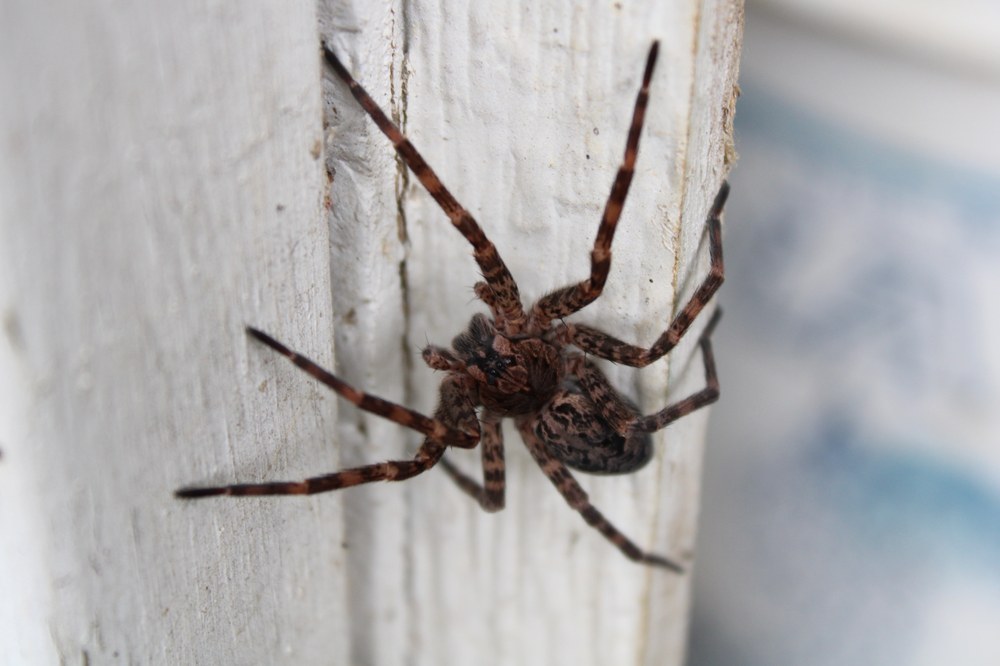Posted: May 11, 2021
Entomology graduate student and IBC Fellow Codey Mathis interviews Dr. Andy Deans about why spiders are so heckin' cool and discuss his upcoming Fall 2021 undergraduate spider course.

Photo by J. Lana Mejias
Why do some male spiders sacrifice themselves to the female during mating? Is spider silk really stronger than steel? Why is sociality likely an evolutionary dead-end for spiders? Why do some spiders mimic ants? How can we understand local declines in spider populations? These are just a few of the questions answered in an exciting new course offering by the Entomology Department at Penn State. In Fall 2021, Drs. Andrew Deans and Eric Yip are shedding light on these innovative and beneficial arthropods and why our societal fear of them is unwarranted.
The idea for the course began years ago when Dr. Deans was looking at spider specimens collected for a class on spiders offered in the 1970s by Dr. Bob Snetsinger. “Because of Dr. Snetsinger’s course and his passion for spiders, we have this historical record in the collection,” remarks Dr. Deans, a professor in the Entomology Department and the curator of the Frost Entomological Museum. “Aside from his own collecting efforts and those from his students, Dr. Snetsinger worked to acquire invaluable, historic specimens for the Frost Museum, some going back as far as the 1800s. Offering a new course on spider biology, one that builds on the historical collection, is an opportunity to follow up on this legacy. It's also an opportunity for me to learn about a group that has never been the focus of my research.”
This course takes the best parts of multiple spider courses that have been taught in the past. Dr. Snetsinger taught his 3-credit course on spiders in the summer semesters in the 1970s. It involved taking students to the same location every year to sample spider diversity, learn about their biology and behaviors, and properly prepare specimens for museum curation. Currently offered in every Fall semester, Dr. Deans teaches a graduate course on insect biodiversity and evolution, in which students learn about insect systematics and how to identify insect families. Though they aren’t insects, spiders are briefly mentioned at the beginning of the course. Finally, Dr. Yip, a post-doctoral scholar in the Tooker Lab, has previously taught a 1-credit seminar course about spiders. In this seminar, students would read papers to provide an overview of arachnid biology and discuss their possible importance as bio-control agents in agricultural ecosystems.
The 3-credit course (ENT497) will be available to all students (not just entomology!) in Fall 2021 (W/F 2:30-5:30p EDT) and co-taught by Drs. Deans and Yip. Students will learn about spider ecology, evolution, identification, and collection methods. Notably, the course will further elaborate on the cultural impacts and public attitudes that people have about spiders. “The major goal of the class is to increase people’s appreciation of spiders,” says Dr. Yip. When asked to describe why spiders are important, Dr. Deans chuckles. “How are they not amazing? They’re such a compelling group, and there’s so much fear for something that, for the most part, are relatively harmless animals.” Another major goal for the course is to initiate a long-term research project about spider diversity. “We developed a standard protocol where we’ll sample various habitats for spider diversity over time and make predictions”, explains Dr. Deans. “This builds a long-term data series that gives the lab component of the course more meaning: we can consider spider declines and their ecology. Students will immediately see the application of the knowledge they’re generating, and I think they’ll get more out of it.”
If this article piqued your interest, make sure to register for the spiders course to learn more about these fascinating arthropods! To read more about Dr. Bob Snetsinger and his legacy, I recommend reading this article by Maggie Anderson for State College Magazine. Thank you to Kasey Packer for researching Dr. Snetsinger’s course, and to Drs. Deans and Yip for providing the fascinating spider content within this article.
Contact Information




